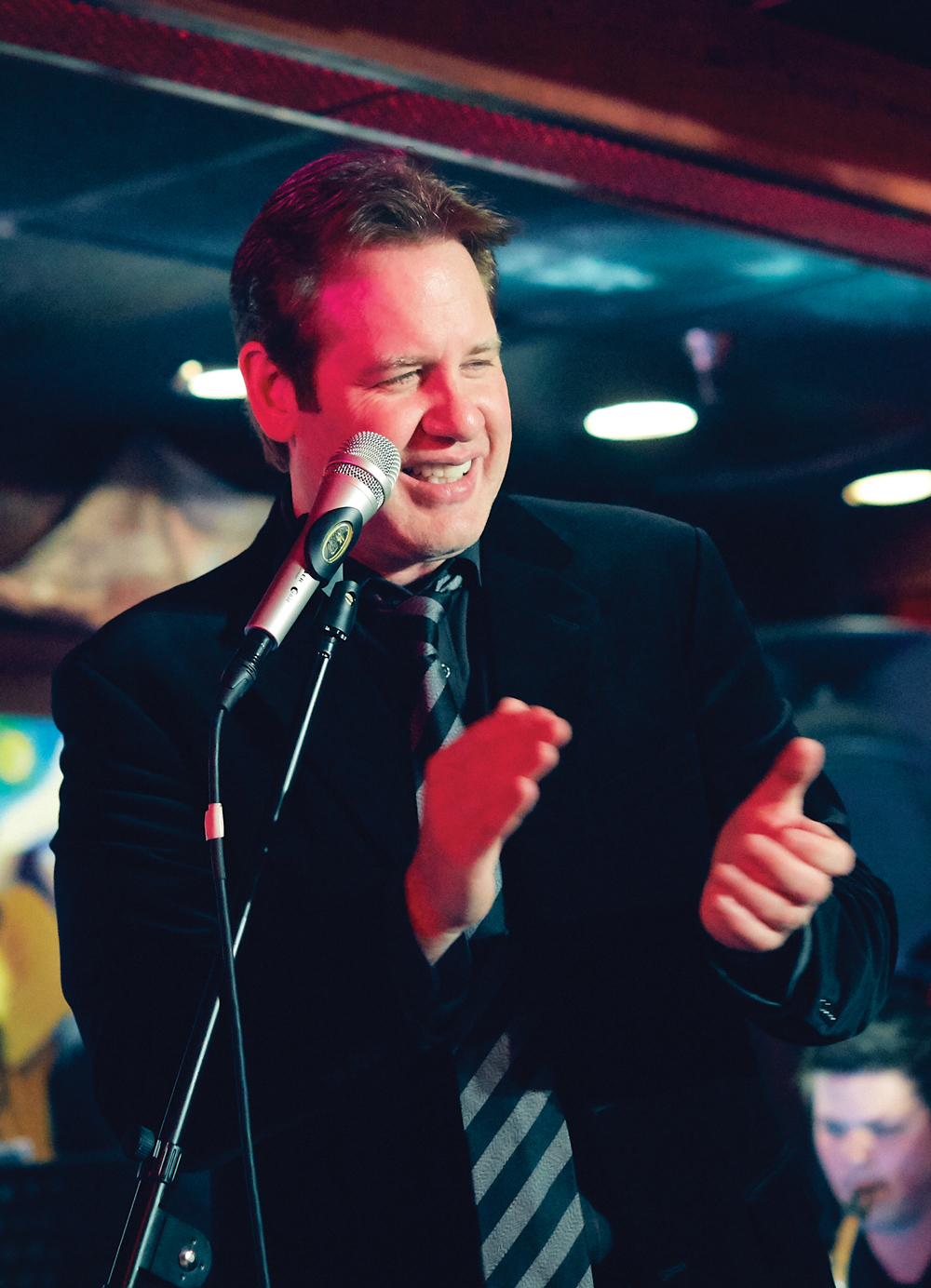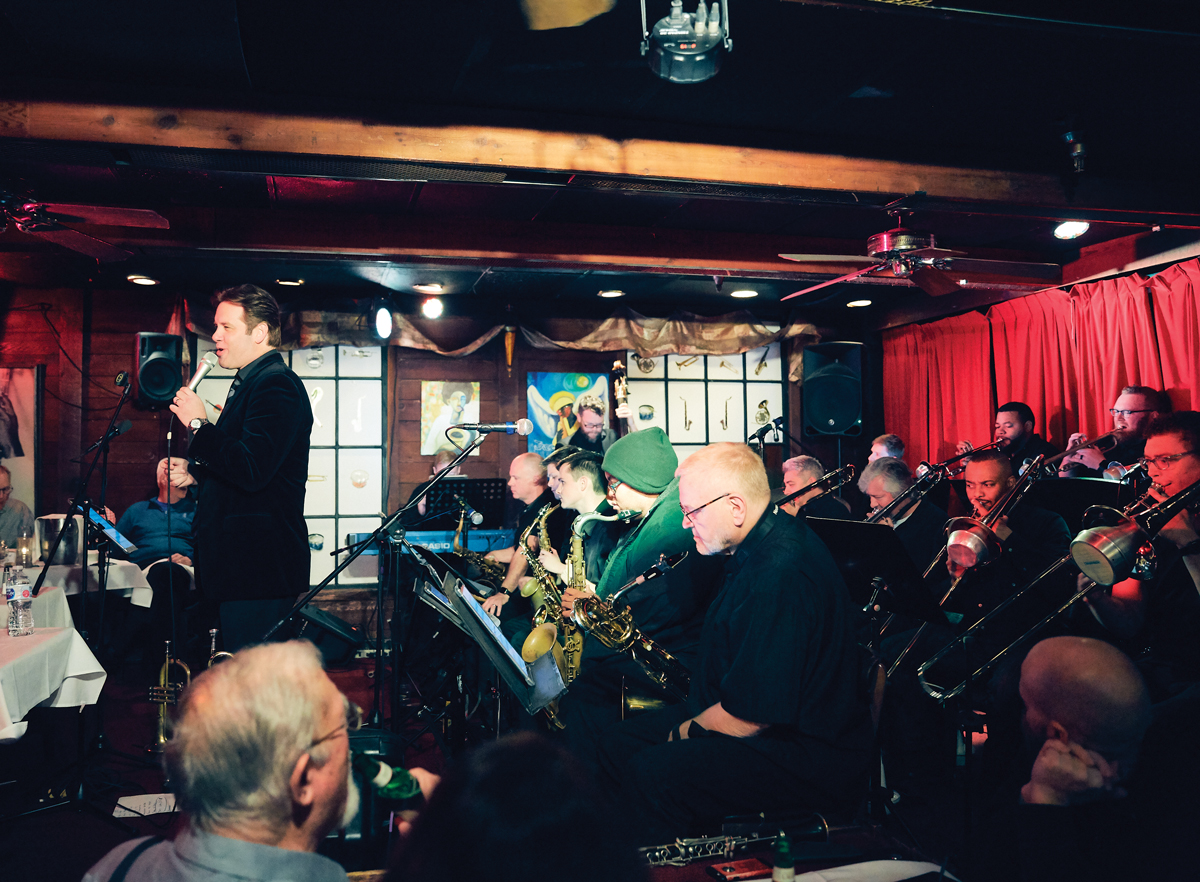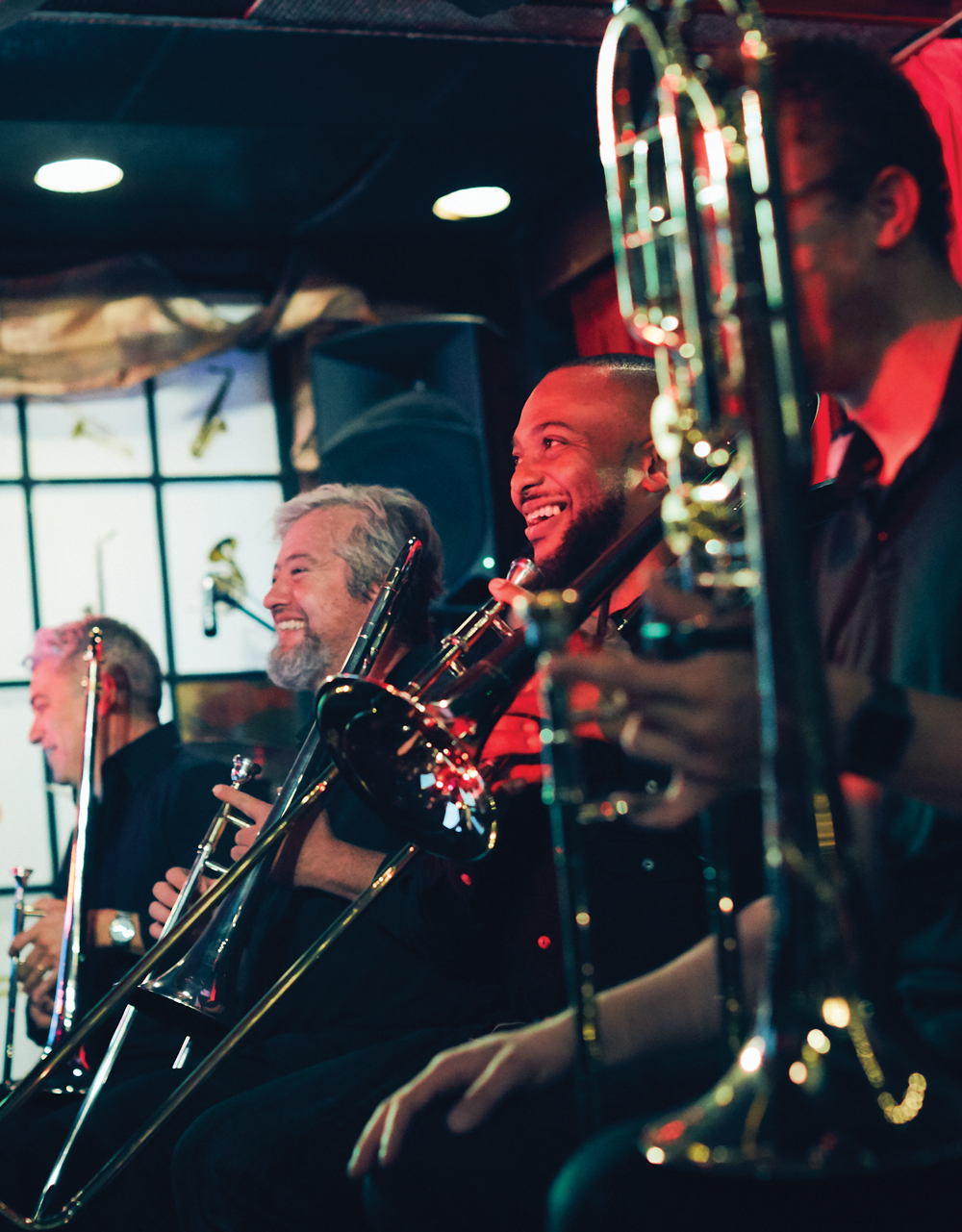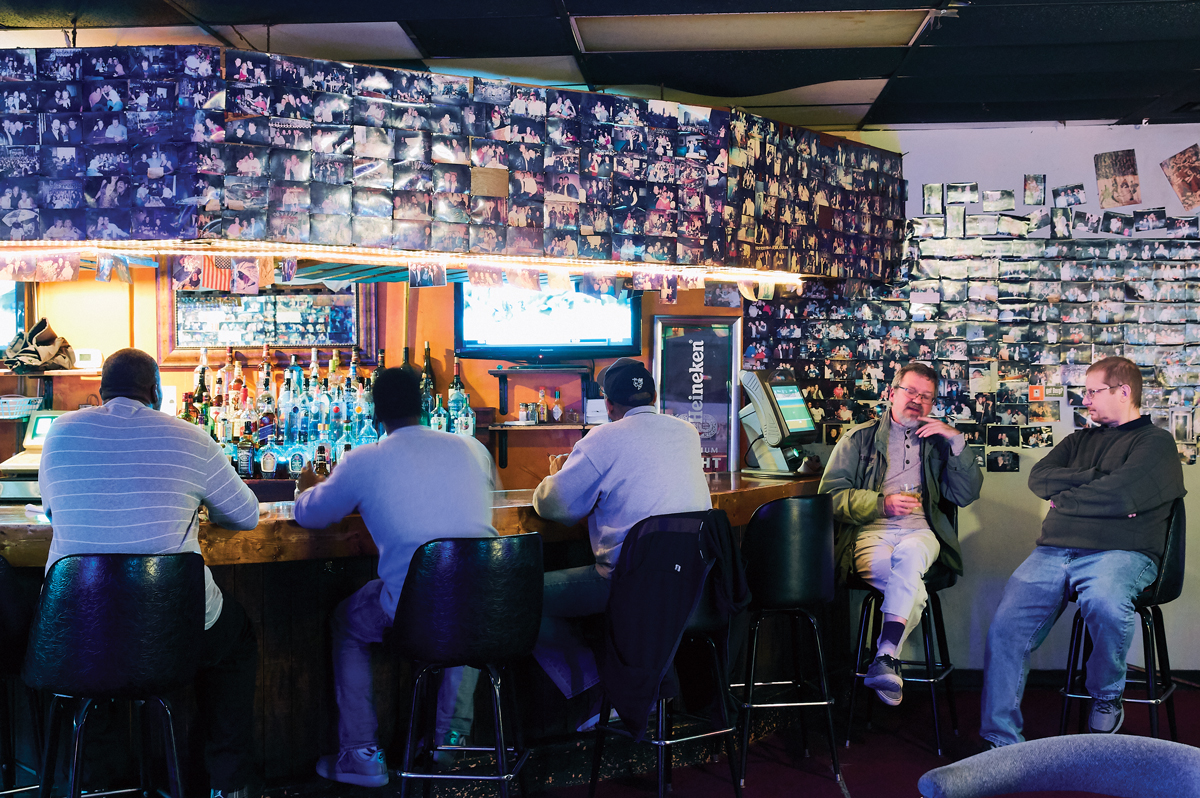
Photograph by Ben Rollins
The Joe Gransden Big Band swings into Ella Fitzgerald’s rollicking blues anthem “When I Get Low I Get High,” the buoyant intro fronted by a muted trumpet. The eponymous front man, in a black blazer, white pocket square poking out neatly, grabs the mic. It’s a Monday night at Cafe 290 in Sandy Springs, home base for Gransden’s 17-piece band. Tonight’s crowd is younger than usual, thanks to the students (and their parents) from the Lovett School, where Gransden’s wife is a band director.
“My coat got sold/Oh Lord, ain’t it cold/But I’m not gonna holler/’Cause I still got a dollar/And when I get low,” Gransden sings, then asks the room, “What I do?” The audience answers, “I get high!” and Gransden adds an aw-shucks aside, still keeping time with the band, “Sorry, Lovett parents.”

Photograph by Ben Rollins
At 46, Joe Gransden—trumpet virtuoso, vocalist, bandleader—is too young to really be an elder statesman of Atlanta’s jazz scene. “He’s more like the jazz ambassador of Atlanta,” says Jim Basile, longtime Atlanta traffic reporter for WXIA-TV and V-103, who is a part-time arranger for Gransden.
Gransden is a busy ambassador, performing five or six nights a week, typically with a smaller lineup—duos, quartets, sextets. He’s a regular at Eddie’s Attic and the Velvet Note, runs a jazz camp for young musicians, gives private lessons, and keeps several standing gigs, including the Tuesday night jazz jam session he headlines at Venkman’s in the Old Fourth Ward and a Wednesday night duet with pianist Kenny Banks at Valenzia in Brookhaven. He juggles all that while holding down one of the rarest jobs in Atlanta’s (or any other city’s) music scene: big-band leader.
“He’s a great leader of people, too,” Basile says. “They used to say about Duke Ellington, ‘He’d get you to play his way and make you think you’re playing your way.’ That’s pretty true about Joe.”
Gransden and his big band headline Cafe 290 on the first and third Monday of each month. As the first generation of rock ’n’ roll dies off, this band harks back even further, to the age of Tommy Dorsey and Ellington. Even with the distractions of a digital age, the big band has found a groove that extends beyond its biweekly appearances at Cafe 290, with annual gigs at New York City’s famed Blue Note, performances with the Atlanta Symphony Orchestra, or at venues like the Ritz-Carlton on Lake Oconee.

Photograph by Ben Rollins

Photograph by Ben Rollins

Photograph by Ben Rollins
“This music is timeless,” says John Scatena, Cafe 290’s owner for all but five years of its 30-year history. In a fragmented musical landscape, it seems almost miraculous that this old stuff from the greatest generation still finds an audience. Gransden and Scatena admit that it was a roll of the dice when the big band was launched in 2009. But it was based on a model that works well in New York City, where Gransden has lived and worked off and on since first arriving in Atlanta about 25 years ago. “Monday night is big band night in the New York clubs, and it packs houses,” Gransden says. “The Broadway musicians are off on Mondays, so there are jazz and big bands all over the place. We’re kind of unique in Atlanta, but it’s working. It remains fresh.”
There was a time when Gransden, who grew up in Buffalo, was more comfortable with a hockey stick in his hands than a trumpet. “The Sabres were killing it in the NHL back then, so I was really into it.”
But music is in his DNA. His father, Bob Gransden, is a pianist and singer. His grandfather, William Ashton Gransden, was a big-band trumpeter. One uncle played bass; another performed in Broadway musicals. Ultimately, though, it was a stranger who set him down his path. When Gransden was in middle school, a guest performance by trumpeter Allen Vizzutti left him “almost in tears,” Gransden remembers. “After that, music was like a drug for me.” One day, he came home from school to find a Chet Baker album on his turntable with a note from his father: “Listen to this.” “It was the first time I really heard somebody playing jazz improvisation, and my whole brain shifted,” Gransden says. “Since then, all I’ve wanted to be is a jazz musician.”
He was in his second year at Fredonia State in Buffalo studying trumpet when he got a call to audition for the Tommy Dorsey Orchestra, one of the longest-running outfits in the business. Dorsey, of course, had died decades earlier, but the orchestra is like a sports franchise—same name, different owners, different leader, but still the major leagues. Gransden got the job, left school at 20, and traveled the world for a year.
“I was the youngest guy in the band,” he says. “The first leg of the tour was in the U.S., six or seven weeks straight. We’d finish the gig, jump on the bus, and drive all night. Stuffed into this space with 18, 19 people, I learned patience, how to gel with a group, how to communicate with professionals who are two, three times my age.”
After that year, Gransden moved to Atlanta (where his parents had moved) and went to Georgia State University, adding to his internal song list by learning four or five tunes a week. Today, Gransden’s band has 300 songs in its playbook, which members read off of iPads onstage.
The day after graduating from Georgia State, he drove to Manhattan to make it in “the capital city of jazz,” Gransden says. “Spent a few years there, went broke, came back to Atlanta to save up, then went back. I tell all my students who want to be professional to pack up and go to New York, crawl on your face for a while.” He returned for good after 9/11. About 20 years ago, between the New York experiments, Gransden started singing. It was a commercial decision; he’d formed a trio—piano, bass, and trumpet—that played every Sunday and Wednesday at Veni Vidi Vici, a now-closed Midtown restaurant, earning $50 and a plate of spaghetti per night.
“One night, the manager says, ‘You guys are doing a great job, but we want a singer, so we might need another band.’ So, I lied and told him I was a singer,” Gransden says. “The next week, I sang, the people liked it, and there was more money in the tip jar.”

Photograph by Ben Rollins

Photograph by Ben Rollins
He spent hours listening to Frank Sinatra, Nat King Cole, and Dean Martin, “realizing the importance of the lyrics, and how when people recognize the words of a song, it brings something out of them, warms them up to you more than when you’re playing in a corner, playing notes that mean something to us but not as much to them.”
Although Gransden enjoys the greater freedom to improvise with smaller lineups, he says, “the big band is a thrill on a whole different level. I’m more of an entertainer for those shows. I play my horn but tend to sing more, and I really enjoy hearing that wall of sound behind me.”
So do his fans, which include Clint Eastwood. More than 15 years ago, a friend convinced a skeptical Gransden to randomly mail a CD to the actor. Several weeks later, Gransden got a phone call from Clint’s wife, inviting him to perform in California. Gransden thought it was a joke until he heard, in the background, Clint’s familiar voice call out, “Hello, Joe!” Now, he regularly performs at Eastwood’s private club, Tehama. And when Eastwood was here filming Trouble with the Curve, he would drop by Cafe 290.

Photograph by Ben Rollins

Photograph by Ben Rollins
Through Eastwood, Gransden met saxophonist Kenny G., who has become an occasional collaborator and appears on the Gransden Big Band’s just-released studio album, Go Getta. The band also released a Christmas album last month. Both that one and Go Getta were funded largely through a $40,000 Kickstarter campaign.
His busy schedule helps provide a comfortable living for his family—his wife, Charissa, is band director for the Lower School at Lovett, and they have an eight-year-old son, Joey. Both Joe and Charissa are cancer survivors. Joe was diagnosed in 2006, but he didn’t miss many gigs during his eight months of chemotherapy, sleeping in whatever green room was available for 15 minutes between sets. “Then, as soon as I got my five-year cancer-free news, Charissa was diagnosed with breast cancer,” he says. “That was tough, but she’s doing really good now. We’ve been very lucky.”
Go Getta features some of the band’s favorite covers, a tribute to the late Glen Campbell (another musician Gransden has worked with), and an original song by Atlanta artist Kipper Jones. Scatena, who has produced many of Gransden’s dozen or so records, hopes this one will be a hit.
Cafe 290 is where the musicians experiment and feel the love of a home crowd. The show is almost over, and Gransden dedicates the penultimate song, “In the Mood,” to Bob Boden, a white-haired guy sitting alone at a table in front. He never missed a night when his wife was alive, and he’s here for every Monday show. “This is for you, Bob,” Gransden says, taking up his trumpet and joining the rhythm. Bob gets up and starts dancing, bopping up and down and side-to-side in the cramped space, a party of one in a crowded room filled with a joyful noise.

Photograph by Ben Rollins
This article originally appeared in our January 2018 issue.














